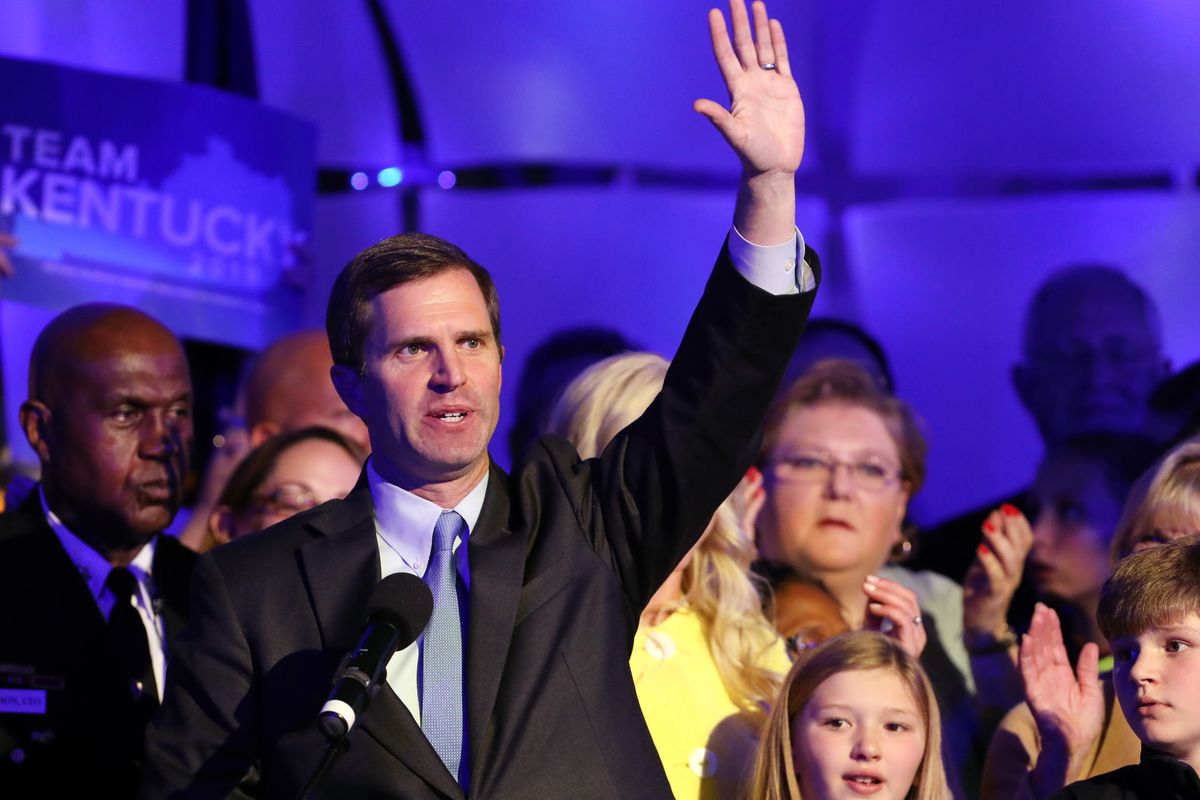
By Ella Nilsen, Tara Golshan, Li Zhou, and German Lopez
It’s not Election Day 2020 yet, but on Tuesday we got the next best thing.
Voters all over the country headed to the polls to decide local and state elections. The headline-grabbing contest was Democrat Andy Beshear beating Republican incumbent Gov. Matt Bevin in the Kentucky governor’s race — a state President Donald Trump won by a whopping 30 percent in 2016. Some caveats: Bevin was among the most unpopular governors in the country, and other Republican leaders in the state outperformed him on Tuesday.
But Beshear’s win was still a big loss for Trump, who campaigned in Kentucky just a day before the election, explicitly tying Bevin’s race to his own reputation. The results also showed that Democrats in Kentucky were fired up — Beshear outperformed the 2015 Democratic gubernatorial candidate in many areas of the state.
The other huge story was Virginia’s state legislature elections, where Democrats flipped both the state House and Senate, ensuring a trifecta with Gov. Ralph Northam (D) already in the governor’s mansion.
Virginia has been trending blue for years, but the fact that Democrats generated so much enthusiasm in an off-year where state legislature elections were the biggest thing on the ballot means the party is organized and enthusiastic, even for traditionally sleepier races.
Many of the questions going forward are going to be what this all means for Trump and Republicans in 2020. It’s not good news for them, for sure. If we learned one thing from Tuesday, it’s that Democrats are fired up — even in redder states.
But there’s a lot of other impacts that extend far beyond Trump.
Loser: Donald Trump
Headlining a Lexington rally for Bevin on Monday night, Trump beseeched Kentucky voters to reelect the Republican governor he was supporting.
“If you lose, they’re going to say Trump suffered the greatest defeat in the history of the world,” Trump said. “You can’t let that happen to me!”
Maybe — just this once — Trump shouldn’t have phrased it in such stark terms, because Bevin losing is exactly what happened. It’s worth stressing that Bevin was incredibly unpopular on his own for saying inflammatory things about Kentucky’s teachers and threatening to cut Medicaid expansion.
But beyond the optics of a Trump ally losing in Trump country, there’s one other worrying sign for Republicans in Tuesday’s results: The 2018 trend of the suburbs rebelling against the president and his party is continuing. Bevin also performed poorer than expected in the traditionally Democratic Appalachian coal counties that went for Trump in 2016. Now, this doesn’t necessarily mean Senate Majority Leader Mitch McConnell — up for reelection in Kentucky next year — is doomed. Nor does it mean Democrats will magically have a landslide in the state in 2020.
But Trump wanted to project strength going into an election year when he’ll be on the ballot, and Bevin’s loss has to hurt, badly.
Winner: Democratic organization and enthusiasm
Virginia and Kentucky demonstrated one clear thing: Democrats were fired up. No matter what caveats exist in each state, that’s great news for the Democratic Party heading into 2020.
Beyond his turnout wins, Beshear’s message could give the national party hope. He ran primarily on health care and education — vowing to protect Medicaid and boost funding for teachers — a strategy Democrats could replicate in other Trump-friendly states and regions like West Virginia, another state that has seen teachers strikes.
Democrats also won their enthusiasm test in Virginia. A caveat here — Virginia has been trending more and more blue every year, so winning was not a huge surprise. However, Democrats were looking for signs of enthusiasm, and they got them in Virginia. Anecdotally, turnout was up significantly in the state. That’s important especially because Virginia had no governor’s race or US Senate contest on the ballot, presenting both Democrats and Republicans with a unique opportunity to show how strong the party apparatus was.
:no_upscale()/cdn.vox-cdn.com/uploads/chorus_asset/file/19351693/1179874229.jpg)
“It shows you the relative strength of the parties at this point in time without anybody at the top of the ticket,” Republican strategist John Feehery told Vox recently. “If you take away any personalities, it just gives you a glimpse with a natural setting of what the political barometer is.”
The political barometer in Virginia, at least, was very good for Democrats. In the last week leading up to Election Day, Democrats and grassroots activists told Vox they were seeing signs of more enthusiasm for voting than usual.
“I think the intensity going in is so strong,” said Tram Nguyen, co-executive director of New Virginia Majority, a group aiming to increase the diversity of the Virginia electorate by encouraging minorities and immigrants to vote.
That intensity lasted, showing that Democrats aren’t just laser focused on beating Trump in 2020. They’re also organizing for races up and down the ballot — and that won them total control in Virginia’s legislature for the first time in a generation.
— Ella Nilsen
Winner: Medicaid expansion
In Kentucky, Mississippi, and Virginia, Medicaid expansion — arguably one of the most effective and life-saving provisions in the Affordable Care Act — was on the line.
For context: The Affordable Care Act initially expanded Medicaid, the federal health insurance program for low income people, to everyone making less than 138 percent of the federal poverty line. But a 2012 Supreme Court ruling weakened the policy, allowing states to reject the expanded program. As of 2019, 36 states and the District of Columbia have adopted the Medicaid expansion and 14 have not.
We’ve seen a wealth of research showing that expanding Medicaid has not only vastly increased access to health insurance, but also improved health outcomes. About 13.6 million adults gained Medicaid coverage under Obamacare. One recent study found that by the fourth year of Medicaid expansion, mortality rates in states that expanded the program were 0.2 percentage points lower than in states that did not.
On Tuesday, voters largely reaffirmed their interest in increasing health care access in their states.
In Kentucky, Beshear beat Bevin, who threatened to end Medicaid expansion in his push to implement work requirements, premiums, and co-payments for the state’s most vulnerable population. As Dylan Scott explained for Vox, there’s a lot of evidence that most Medicaid recipients do work, and many could still lose their coverage because the requirements aren’t structured to address the irregularities of low income work. Ending Medicaid expansion in Kentucky could have stripped health insurance from around 400,000 people.
Virginia’s Democratic governor managed to pass Medicaid expansion, but it has had eligibility limitations because of the state’s Republican statehouse. But on Tuesday, Democrats flipped the state Senate and House, ensuring the program would be protected in the future and giving Democrats the chance to get rid of those limitations.
—Tara Golshan
Winner: Teachers in Kentucky
When Kentucky’s Republican governor Matt Bevin went after state pensions in 2018, teachers across the state took to the streets in protest. And when Bevin responded by calling them “ignorant” and “thugs,” Kentucky teachers rallied around the phrase “Remember in November” to make education a top priority for voters. It wasn’t enough to flip the state’s seats in Congress in the 2018 midterms, five out of six of which are still held by Republicans.
But on Tuesday, they did remember for the governor’s race.
Kentucky’s underfunded pension system, one that since 2000 has accumulated $43 billion in debt, was at the center of the governor’s race. During his first term, Bevin pushed a reform that cut pensions for new teachers and funding for public schools, resulting in massive teacher protests. Earlier this year, Kentucky teachers called in sick en masse, shutting down every public school in the state.
:no_upscale()/cdn.vox-cdn.com/uploads/chorus_asset/file/19351703/GettyImages_945843846t.jpg)
And Bevin didn’t try to endear himself to teachers; he called them “selfish” and said kids were likely exposed to sexual assault because teachers were protesting instead of staying in the classrooms. He eventually apologized, but not without saying teachers were acting like “thugs.”
Beshear made education a central part of his campaign for governor. His platform on education for the state gives every teacher an immediate $2,000 across-the-board pay raise and ensures teachers aren’t paid less than $40,000. He is also proposing new funding streams for the pension system — proposals Bevin attacked as unfeasible.
It should be said that even with Beshear in the governor’s mansion, he will face a challenge in the state legislature that remains controlled by Republicans. Nevertheless, Kentuckians voting out Bevin is a huge victory for teachers after a year of protests.
—Tara Golshan
Loser: the NRA
Virginia voters on Tuesday helped Democrats take the state legislature out of Republican hands. In doing so, voters also handed a major victory to gun control advocates in the state — and a major defeat to the National Rifle Association, also headquartered in Virginia.
Gun control became an especially relevant issue in Virginia this year with the May shooting at Virginia Beach, in which a gunman killed 12 people. That led Democrats to try — and fail — to pass a new slew of gun control measures. But the topic has stuck in the public’s mind: A poll in October from the Washington Post and Schar School found that three in four voters rate gun policy as a “very important” issue in relation to their ballots, making it the top issue overall.
The advocacy group Giffords Law Center gives Virginia a D for its gun laws and ranks the state 22 out of 50 for the strength of its laws. Virginia does not, for example, have universal background checks, a “red flag” law that lets courts take away weapons from people deemed dangerous, or an assault weapons ban.
:no_upscale()/cdn.vox-cdn.com/uploads/chorus_asset/file/19351715/1160098049t.jpg)
Democrats have been trying to change that, with Democratic Gov. Ralph Northam pushing for stronger gun laws since his election last year. But after Northam called for a session to consider his proposals earlier this year, the Republican-controlled legislature quickly voted along party lines to adjourn the legislature until after the elections.
So gun control advocates hoped to bank on the Virginia elections to flip the legislature and, subsequently, get stricter gun laws passed. According to NPR, gun control groups outspent the NRA in the state by about 10 to 1 as of October.
Now, gun control groups have a potential majority in the state legislature, and the NRA no longer does. That could lead to big changes in Virginia’s gun laws.
—German Lopez
Loser: Republican gerrymandering in Virginia
Part of the reason Republicans hung onto the Virginia state legislature for so long was gerrymandering. With Democrats’ win on Tuesday, Republicans can no longer draw the maps to their advantage — in either state House or US House districts.
The party in control of Virginia’s House of Delegates doesn’t just have a huge hand in crafting policy; it’ll also be responsible for drawing Virginia’s new congressional maps in 2021 after the 2020 census. And with Tuesday’s win, state Democrats become the big winners of the future here — with huge implications for the state’s congressional delegation.
Given the state’s history with gerrymandering, that process will be closely watched. Virginia’s old maps were drawn by House Republicans in 2011; packing black voters into districts to dilute their vote. And that was noticeable even during Democrats’ big wins in 2017; even though Democrats won the overall vote by about 9 points in House of Delegates races, gerrymandered districts made it so Republicans still controlled the chamber — barely.
A lot has happened since then. In 2018, a district court in Virginia ruled the old maps an unconstitutional racial gerrymander, and new maps fairer to Democrats were drawn at the beginning of the year (these maps may have also helped put them over the top in Tuesday’s election). To solidify that, the US Supreme Court upheld the lower court ruling this summer.
But the process of redrawing is about to start all over again, and the House of Delegates wields the pen.
“Whether or not we’ll have fair maps for the next decade remains to be seen,” Tram Nguyen, the co-director of New Virginia Majority, told Vox recently.
Democrats got their chance on Tuesday night.
—Ella Nilsen
Winner: Voting reform
Ranked-choice voting advocates scored a big win Tuesday, when New York City overwhelmingly approved a ballot measure that made it the most populous city to adopt the reform.
Under ranked-choice voting, voters rank their top five candidates in order of preference, rather than simply picking one candidate. It’s a set-up that pushes candidates to engage with a broader swath of voters in order to pick up their support and allows voters to support lesser-known candidates without a sense of “wasting” their vote.
The past few years have marked significant progress for ranked-choice voting, which is now used in more than 20 cities. The tactic, first employed for a federal election by Maine in 2018, has also garnered prominent backing from the likes of Sens. Elizabeth Warren and Michael Bennet.
The New York City ballot measure means local voters will be able to use ranked-choice starting in 2021 for regional elections like City Council. In California cities like San Francisco and Berkeley where the reform has been used, ranked-choice has been found to increase the diversity of the candidates vying for seats, and even that of those who are ultimately elected.
Plus, because New York City has now approved the measure, it’s possible even more cities and states will consider adopting the same when more ballot initiatives are up for a vote next year.
—Li Zhou
Winner: Equal rights amendment
In addition to boding well for the party going into 2020, Democrats’ sweeping wins in Virginia could also mean crucial momentum for the Equal Rights Amendment.
The ERA, a potential amendment to the Constitution, would codify equal protections for men and women under the law, guaranteeing protections like equal pay. It needs to be ratified by 38 of 50 state legislatures in order to come to fruition. Presently, the ERA has been approved by 37. If Virginia were to vote in favor of the ERA, it would hit the threshold it needs for ratification.
:no_upscale()/cdn.vox-cdn.com/uploads/chorus_asset/file/19351750/968563040t.jpg)
That said, Congress had previously set 1982 as a deadline for this process, which means that lawmakers would have to vote to undo that deadline in order for the amendment to ultimately be ratified. Given the uncertainty around this potential deadline and whether Congress would be willing to take action on it, it’s not yet certain that the measure will advance.
A vote to ratify it from Virginia’s newly minted state legislature, however, would mark a massive step forward.
—Li Zhou









